Thursday, October 25th., 2018
"...One of those days, Swami took him by
surprise when He told him that he would one day be the Prime Minister of
India. At that point in time, Vajpayee’s political party, the Jana Sangh, had just two seats in the 545-seat Indian Parliament!
The idea of him becoming the Prime Minister
appeared a bit too farfetched then. But he accepted Swami’s words with
great reverence and humility, and was moved to tears....
Contrary to what Swami had said, it
appeared as though Vajpayee’s best days in the political field were over
as his influence waned and he even lost his seat from Gwalior in the
mid 1980s. The events didn't deter his faith or love in Swami....
...The country saw progress and prosperity,
initiative and industry, distress and development during his three terms
as the Prime Minister. Though his first two terms were short-lived,
during the third Vajpayee achieved the daunting task of holding together
a fragile coalition that was the first non-Congress government to
complete its term of five years.
He built up his party, the BJP into a force-de-majeure
in the Indian polity...In office19 March 1998 – 22 May 2004, In office16 May 1996 – 1 June 1996, In office26 March 1977 – 28 July 1979..."
<<...Mr Vajpayee was the Chief Guest at the 17th Convocation of SSSIHL held on Nov 22, 1998.
During his convocation address, Mr Vajpayee, then the Prime Minister of India stated, "The Indian tradition believes that Truth or Sathya is God. As the Sai model of education affirms, the students of this university are not just students, but seekers of Truth.
The divine guidance of Bhagavan Sri Sathya Sai Baba has, thus, elevated even education to the level of worship of God...>>
<<...Sanskrit shloka.
Na Tvaham Kamaye Rajyam Na Swargam Na-punarbhavam.
Kamaye Dukha-Taptanam Praninamarti Nashanam.
It means, I long for neither a state
power, nor for heaven or reincarnation. My only desire is to see that
the sufferings of all living beings are removed..."...>><<...In the talk that Mr Vajpayee delivered in the Summer Course (Jun 20, 1978), he said:
"...The Summer Course on Indian Culture and Spirituality must have impressed on you, the new generation, that it is Dharma that matters and not just the accumulation of degrees and diplomas. These may help you to earn money, but they cannot bring peace...">>
"...The Summer Course on Indian Culture and Spirituality must have impressed on you, the new generation, that it is Dharma that matters and not just the accumulation of degrees and diplomas. These may help you to earn money, but they cannot bring peace...">>
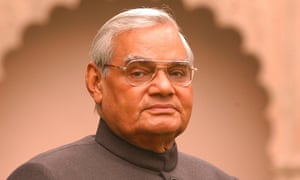
H2h Special
Posted on: Aug 21, 2018
A BHARAT RATNA THAT FOUND A PLACE IN THE
LORD'S 'TREASURE CHEST'
A BHARAT RATNA THAT FOUND A PLACE IN THE
LORD'S 'TREASURE CHEST'
Indeed blessed and noble is the soul who,
inspite of all great achievements, is rooted in goodness, humility and
considers the opportunity to serve others as the greatest wealth. They
have the ability to wear the crown of power and authority, not with
hubris, but with a grace and detachment that adds glory to the position
itself.
Such humans are hard to come by, and even when they do, they may miss our cursory vision. But, we have been fortunate in that, Bhagawan, in all His mercy, has called our attention to few such noble contemporaries so we may observe them, be inspired and strive to emulate them in our quest to become better human beings. And Bhagawan does so by showering a special, warm love on these individuals, observing which we may sit up and wonder, what is it in the nature of this person that has entreated such grace.
One such life was that of Bharat Ratna, Sri Atal Bihari Vajpayee who left the mortal coil on Aug 16, 2018.
Such humans are hard to come by, and even when they do, they may miss our cursory vision. But, we have been fortunate in that, Bhagawan, in all His mercy, has called our attention to few such noble contemporaries so we may observe them, be inspired and strive to emulate them in our quest to become better human beings. And Bhagawan does so by showering a special, warm love on these individuals, observing which we may sit up and wonder, what is it in the nature of this person that has entreated such grace.
One such life was that of Bharat Ratna, Sri Atal Bihari Vajpayee who left the mortal coil on Aug 16, 2018.
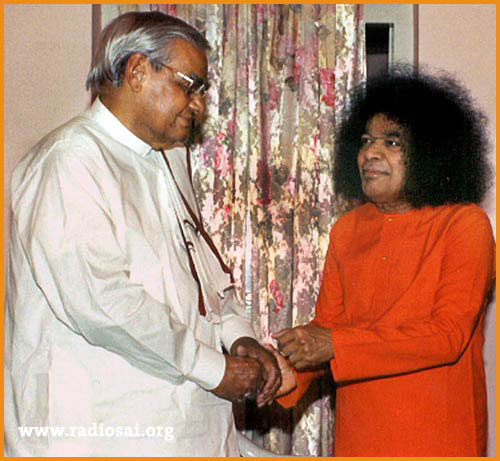 |
Being a staunch follower of the Sanathana
Dharma and an ardent believer of the Bharatiya culture, it is not
surprising that he fell in love with Bhagawan Sri Sathya Sai Baba in the
early 1970s.
In fact, he was an active participant and
the chief guest of the Summer Course in Indian Culture and
Spirituality, held in Swami’s ashram at Whitefield, Bangalore, in 1978.
He was then the external Affairs Minister in Prime Minister Morarji
Desai’s cabinet.
His association with Bhagawan and Swami's special love for this devotee began ever since, or rather became visible for all.
The devotee in him can be seen from a recollection by Dr T Ravikumar, Warden, Brindavan Campus, SSSIHL:
“He missed his flight and therefore stayed back at the college guest room which was modest at best, considering his stature. The next day, when the students went to give him coffee early in the morning, he was missing.
"When he
returned later, we got to know that he had joined the devotees at
Belathur (a neighbouring village to Kadugodi where Swami's ashram in
Bengaluru is located) going for Swami’s Nagar Sankeertan Darshan.”
One of those days, Swami took him by
surprise when He told him that he would one day be the Prime Minister of
India. At that point in time, Vajpayee’s political party, the Jana Sangh, had just two seats in the 545-seat Indian Parliament!
The idea of him becoming the Prime
Minister appeared a bit too farfetched then. But he accepted Swami’s
words with great reverence and humility, and was moved to tears. He
continued to think, speak and work for his motherland. He also continued
to visit Swami whenever he managed to find time, which was hard to come
by as he took up multiple political responsibilities.
Contrary to what Swami had said, it
appeared as though Vajpayee’s best days in the political field were over
as his influence waned and he even lost his seat from Gwalior in the
mid 1980s. The events didn't deter his faith or love in Swami. He was
often seen in the Prasanthi Nilayam bhajan hall, sitting
cross-legged on the floor with the students and devotees, singing the
glory of God. He refused to accept any privileged seating or place, for
all are the same in the eyes of God. Dr M Sainath, a former student of
Swami, recollects:
“In fact, during one of the Akhanda bhajan sessions, he quietly walked into the mandir at around 10 PM. He sat at the rear entrance of the bhajan hall, singing bhajans till 4 AM. Then, he went back only to return for the darshan session in the morning. He had no airs about him - only simplicity and devotion.”
“In fact, during one of the Akhanda bhajan sessions, he quietly walked into the mandir at around 10 PM. He sat at the rear entrance of the bhajan hall, singing bhajans till 4 AM. Then, he went back only to return for the darshan session in the morning. He had no airs about him - only simplicity and devotion.”
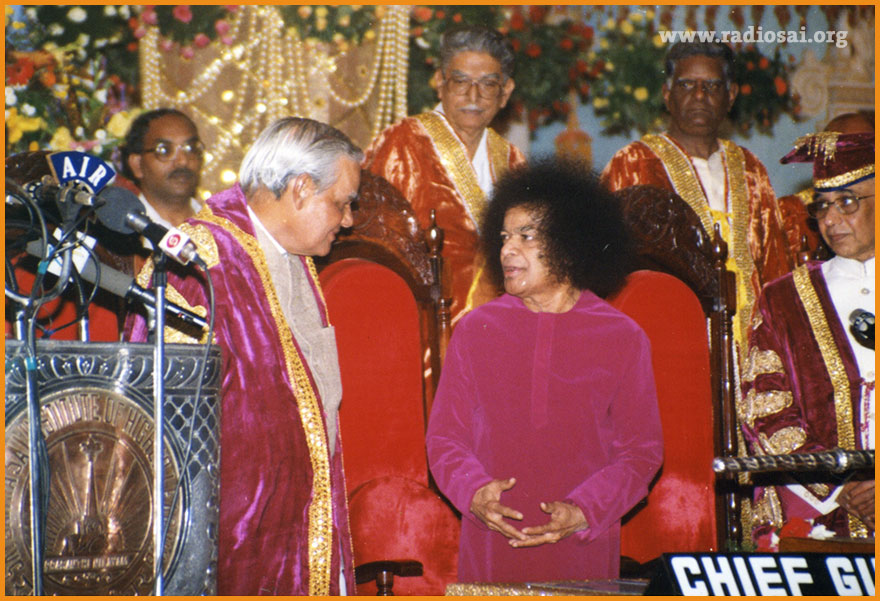 |
| Mr Vajpayee was the Chief Guest at the 17th Convocation of SSSIHL held on Nov 22, 1998. During his convocation address, Mr Vajpayee, then the Prime Minister of India stated, "The Indian tradition believes that Truth or Sathya is God. As the Sai model of education affirms, the students of this university are not just students, but seekers of Truth. The divine guidance of Bhagavan Sri Sathya Sai Baba has, thus, elevated even education to the level of worship of God". |
‘He that humbleth himself shall be exalted’
and the perfect epitome of this statement is Sri Vajpayee. He indeed
went on to become the Prime Minister of the nation. Not surprisingly, as
soon as he could, he visited his Swami. Bhagawan blessed him with an
interview in Brindavan and showered so much love that he was
overwhelmed. Emotionally, he asked,
“Swami, can I please come here to your house now and then?”
Bhagawan replied sweetly,
“Vajpayee, this is your Mother’s home. Come whenever you wish.”
“Swami, can I please come here to your house now and then?”
Bhagawan replied sweetly,
“Vajpayee, this is your Mother’s home. Come whenever you wish.”
On His part, Swami always received
Vajpayee the way a mother would welcome her child. Mr Poornachandra Rao,
another alumnus recollects:
“Swami personally came to the guest house to plan the hospitality (before Mr Vajpayee visited in 2003). He said that the guest room was not good enough for His old friend and ordered that Mr Vajpayee be put up in the special room that is reserved for Swami alone! On the day Prime Minister visited, we naturally made elaborate dinner arrangements for him. But Mr Vajpayee simply asked for Ragi Sankati (Ragi millets with curds), a dish he knew to be Swami’s daily dinner. Seeing the interaction between him and Swami, we realised that there is no difference between what the devotee and the Lord feel for each other.”
“Swami personally came to the guest house to plan the hospitality (before Mr Vajpayee visited in 2003). He said that the guest room was not good enough for His old friend and ordered that Mr Vajpayee be put up in the special room that is reserved for Swami alone! On the day Prime Minister visited, we naturally made elaborate dinner arrangements for him. But Mr Vajpayee simply asked for Ragi Sankati (Ragi millets with curds), a dish he knew to be Swami’s daily dinner. Seeing the interaction between him and Swami, we realised that there is no difference between what the devotee and the Lord feel for each other.”
Swami always presented Mr Vajpayee as a true Brahmachari - one who is in the quest for Brahman. “He did not want to get married and get distracted into Samsara. It is not a path for normal mortals”, Swami would often tell the students.
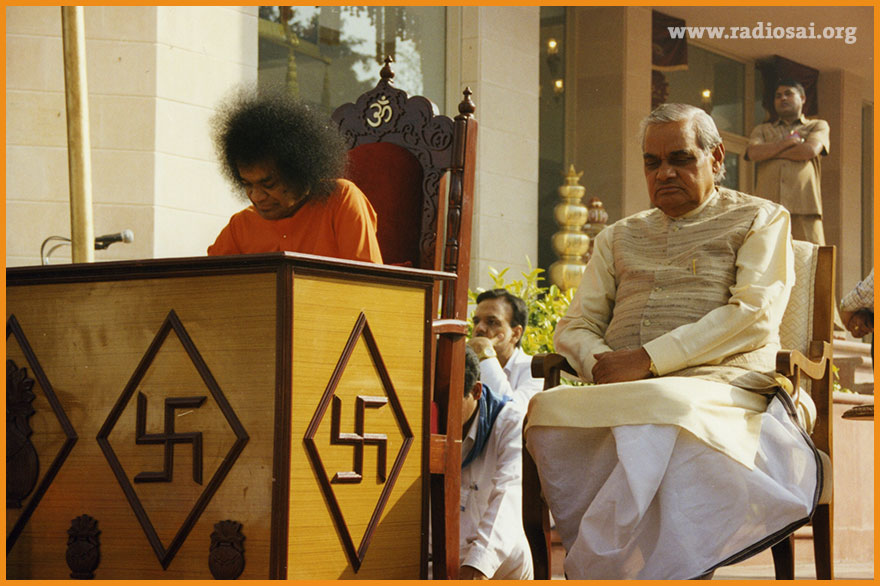 |
| With Bhagawan at the Sri Sathya Sai International Centre, New Delhi, 1999 |
The country saw progress and prosperity,
initiative and industry, distress and development during his three terms
as the Prime Minister. Though his first two terms were short-lived,
during the third Vajpayee achieved the daunting task of holding together
a fragile coalition that was the first non-Congress government to
complete its term of five years.
He built up his party, the BJP into a force-de-majeure
in the Indian polity. The foundation for all that was his devotion to
Swami whom he kept visiting for recharging his batteries.
He retired from active politics in 2005
and began to dedicate more time to his spiritual growth. A time then
came when he was no longer able to travel to Swami.
In 2009, he suffered a stroke which
impaired his speech. How could Swami hold back? On April 12, 2010,
during His visit to the capital city of Delhi, Swami paid an
‘unscheduled’ visit to Mr Vajpayee at his residence. Though the students
who had accompanied Swami to Delhi didn’t go along, they could judge
the joy Vajpayee must have received by seeing the joy Swami Himself
exuded after meeting him. After all, isn’t the devotee and the Lord a
reflection of each other?
An eye-witness who was fortunate to be present during the visit noted a very poignant statement that Swami made:
“See Vajpayee, some time back you were always surrounded by people - officers, ministers and everyone. Now, there is none. But I will always be there - then, now and in future.”
“See Vajpayee, some time back you were always surrounded by people - officers, ministers and everyone. Now, there is none. But I will always be there - then, now and in future.”
It was possibly the overwhelmed response
of a devotee who did not want to remember anything else after this
interaction that Vajpayee soon ‘suffered’ from dementia. He was now
surrounded by Swami through His pictures which adorned almost all walls
in his room and home. That was how it was till his final moments too.
And when the nation (and several nations across the world) paid rich
tributes to him after his death on the August 16, 2018, two pictures of
Swami stood in their frames behind him.
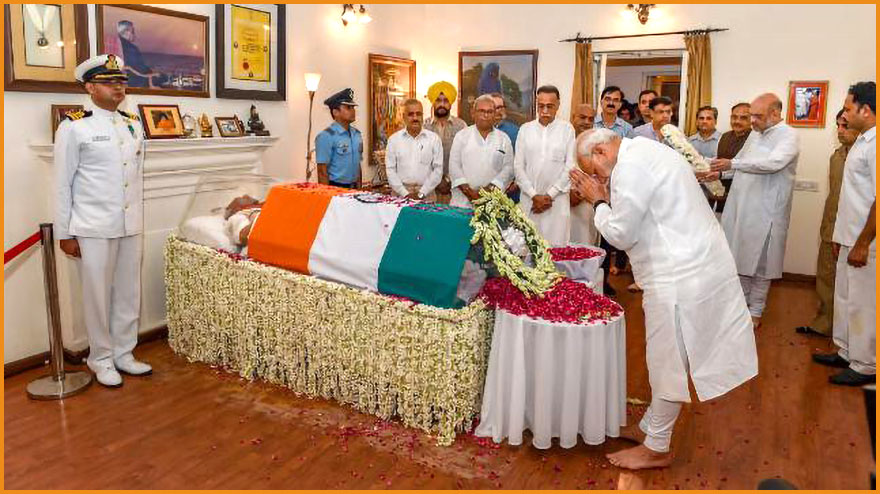 |
Prime Minister of India, Sri Narendra Modi Paying Homage to Sri Atal Bihari Vajpayee at his residence Image Courtesy: India Today |
No wonder that the great man and humble
devotee offered Swami a place at his head when he left the mortal coil.
It was symbolic of the permanent place in his heart that he had offered
to Swami and the permanent place he had won in Swami’s heart.
In 2001 when Swami's second Super
Speciality Hospital was ready for inauguration, He expressed His wish
that Mr Vajpayee be invited to inaugurate the hospital. That is how on
Jan 19, 2001 Mr Vajpayee was again beside Swami, this time as the Chief
Guest to the inaugural ceremony.
It was a beautiful sight to see Bhagawan
leading Mr Vajpayee up the dais, holding his hand lovingly (Mr Vajpayee
was having some difficulty in walking due to health issues). In His
discourse that day Swami expressed His appreciation for Mr Vajpayee in
glowing terms when He said,
“Our Prime Minister Vajpayee took great
pains to come here. Leaders like him are very essential for this world.
He is a leader who supports and encourages noble causes like this.
Ministers who extend their cooperation for good causes are very much
necessary for the nation to progress. They should have noble feelings
and love for God to attain Divine grace. There is nothing that one
cannot achieve if one has Divine grace.”
Even as we remember this great son of
Bharath and the special place he had earned in Swami's heart, we wish to
present for you the edited transcript of the talk he delivered on that
occasion. We pray that Mr Vajpayee rests in peace at Swami's lotus feet.
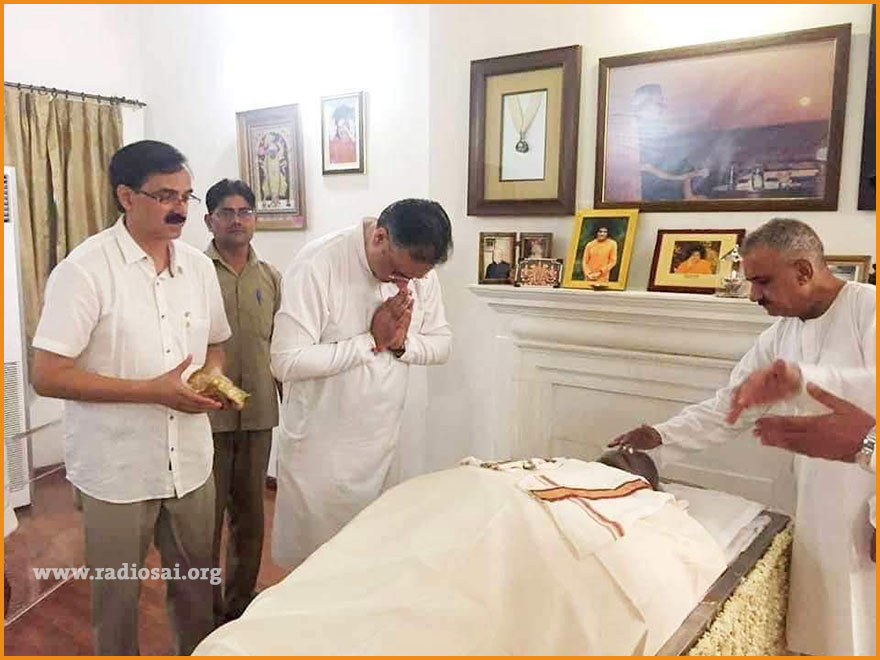 |
| Mr Jatinder Cheema, Vice President of Sri Sathya Sai Seva Organisations, India, placed Swami's Vibhuti on the forehead of Sri Atal Bihari Vajpayee and paid homage on behalf of Sri Sathya Sai Organisations, India |
Inaugural Address by Sri Atal Bihari Vajpayee on Jan 19, 2001 at the
Sri Sathya Sai Institute of Higher Medical Sciences
Sri Sathya Sai Institute of Higher Medical Sciences
Speech by then Prime Minister Late Sri Atal
Bihari Vajpayee at the Inaugural Ceremony of Sri Sathya Sai Super
Speciality Hospital, Bengaluru - 19 Jan, 2001
Bhagawan Sri Sathya Sai Baba, Governor of
Karnataka Smt Rama Devi, Chief Minister of Karnataka Sri S. M Krishna,
Chief Minister of Maharashtra Sri Vilasrao Deshmukh, Sisters and
brothers. Before I begin I would like to apologise for the long delay in
my arrival here.
I had to attend two other functions this
morning, they went on longer than expected. I would like to thank you
all for waiting so long and so patiently. I know you have been waiting
for Baba not for me!
I am honoured by Bhagawan Sathya Sai
Baba's decision to invite me to inaugurate this magnificent temple of
healing that He has built in the capital of Karnataka. I have visited
His Temple of learning at Prasanthi Nilayam several times. I have also
seen His Super Speciality Hospital at Puttaparthi. I had then remarked
to myself that the people of Andhra Pradesh are lucky to have such a
magnificent Hospital.
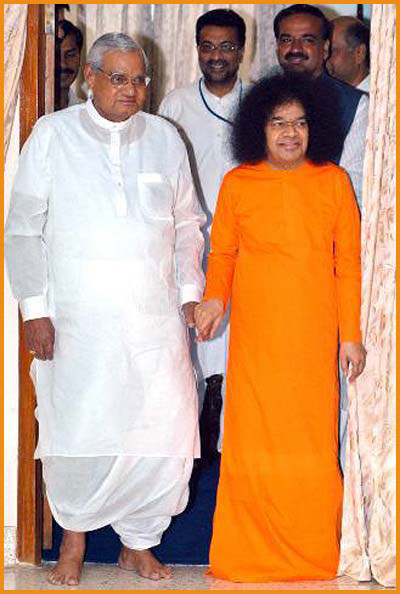 |
|
| At Trayee, Brindavan Ashram |
I am glad that in neighbouring Karnataka
too can now share in the spiritual and physical well-being that Bhagawan
generates. Friends, I have seen many hospitals in India and abroad. In
some of them I have also been a patient. As was the case most recently
at Breach Candy Hospital at Mumbai. However I can honestly say that I
have rarely seen a Hospital so magnificent, so grand and so
breathtakingly beautiful as this one.
When I first saw the photographs of this
Institution I told myself that this cannot be a Hospital. Rather it
looked like a palace, but a palace with a difference. A palace of
healing that is equally accessible to the poor as it is to the rich. I
used the word palace deliberately. For Baba's is truly an empire of the
soul, an empire that, that knows no national boundaries. And no
divisions of caste, creed or colour.
From what I know of the meticulous care
with which Bhagawan runs every Institution of His. And He runs an
incredibly large number of them. I am confident that the insides of this
Hospital will more than match its outsides. As always He has assembled a
team of the best doctors and the staff. Again as always many of them
are voluntarily offering their services to Baba and to the people.
The high domed prayer and meditation hall
in the centre of the building alone makes this place a unique
combination of Temple and Hospital. It will surely generate tranquillity
and hope in patients’ minds. Sanctified by divinity it will encourage
the curing of diseases not merely of the body, but of the mind and the
spirit as well.
Friends, to me what makes this Hospital
unique is the largely free services by which the poor too will get the
same five-star healthcare as the rich do. There are many private
hospitals in our country in big cities whose doors are closed even to
the middle class. The rich too will be a good deal poorer in the wallet
when they take treatment from these hospitals.
By setting up this Hospital, Baba has shown
that just as the doors of a temple do not recognise the feet of a rich
or a poor. So too should a good hospital offer services to all those who
need them. Baba's ideal which is also my ideal is best expressed in a
Sanskrit shloka.
Na Tvaham Kamaye Rajyam Na Swargam Na-punarbhavam.
Kamaye Dukha-Taptanam Praninamarti Nashanam.
Kamaye Dukha-Taptanam Praninamarti Nashanam.
It means, I long for neither a state
power, nor for heaven or reincarnation. My only desire is to see that
the sufferings of all living beings are removed.
Friends, the present healthcare system in
our country is a far cry from this ideal. India is still only about
five hospital beds per 1000 population. We have also have only six or
seven physicians per 1000 population. As a result a majority of over
population is still serviced by practitioners of traditional medicine or
by those who are not adequately trained.


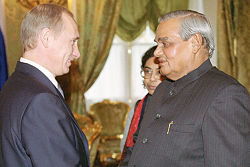 10th
10th